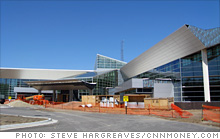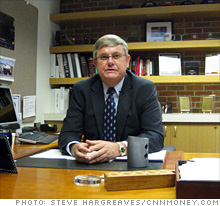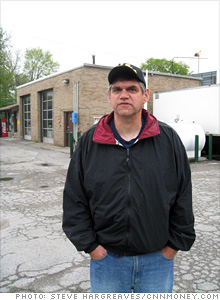Solar brightens a bleak Michigan town
Rife with auto layoffs, Saginaw residents hope a big expansion at the nearby Hemlock solar plant can help jumpstart their battered economy.
 |
| Saginaw, Mich., has lost many jobs with the declining auto industry. |
 |
| Hemlock Semiconductor, which makes silicon for solar panels, is in the midst of a $1 billion expansion near Saginaw. |
 |
| Hemlock executive Gary Homan has high hopes for solar. |
 |
| Saginaw resident Kelsie Short says it's tough to find a job in town. |
 |
| David Denno used to work making parts for cars. Now he wants a job at Hemlock. |
SAGINAW, Mich. (CNNMoney.com) -- Outside Saginaw, Mich., an old auto town of 56,000 people about 100 miles northwest of Detroit, a company making silicon for solar panels is doing the exact opposite of the Big Three. It's hiring.
Hemlock Semiconductor is in the midst of a huge $1 billion expansion that'll ultimately add up to 400 new jobs at the sprawling plant which already employs 1,600 people.
"People are relying on it," said one Saginaw resident, stopping into a local coffee shop on a quick break from work. "They are the bright spot in this area."
Hemlock, majority-owned by Dow Corning, a joint venture between the chemical giant Dow (DOW, Fortune 500) and the glass maker Corning (GLW, Fortune 500), has been making silicon wafers in the area since the 1960s, mostly for computer chips.
In 2000, after a shortage of silicon in the solar market, the company decided to begin making it for solar panels.
Now, sales to the solar industry have eclipsed sales to the computer industry and account for nearly all the company's future growth plans.
"The growth is just phenomenal," Gary Homan, Hemlock's director of marketing and sales, said while giving a tour of the tightly guarded facility. "We have a lot of confidence on the long-term potential of the solar industry."
The plant itself looks more like a refinery than a high-tech factory, with what seem like miles of giant stainless steel tubing snaking the huge facility. Steel cooling towers stand hundreds of feet in the air -- all that's missing are the flames.
All this goes into turning sand into silicon -- one of the purest man-made substances. Electronics makers prize it for this purity; it's the cleanest substance in which to lay electronic wiring.
Silicon is a key ingredient for solar panel makers because photons from the sun passing through the material creates electricity.
Hemlock is now the leading silicon supplier to seven of the world's top 11 solar panel makers.
With most of its sales being overseas, why is the company embarking on such a huge U.S. expansion? It's pumping even more money into a plant in Tennessee.
For one thing, Homan said it's the quality of workers in the Midwest. They're educated, skilled, reliable and backed by top universities. Many companies expanding in the Rust Belt states say it's the region's top-notch workers that lured them to the area.
But another reason Homan cites is his optimism for the solar industry's U.S. future.
"The electricity, without incentives, will be cost competitive with nuclear or fossil fuel technology" by 2014 or 2015, he said, repeating a belief widely held by those in the solar industry. "Long term, the world's largest market will be the United States."
And that might mean even more expansion, which the people in Saginaw will no doubt welcome.
The town, an old lumber outpost built on the banks of the Saginaw River, has seen its fortunes wane with the loss of jobs in the manufacturing sector.
Parts of town are still nice, but parts seem pretty rough. Boarded-up houses line the main avenues into town. The downtown seems pretty barren. Revealing its manufacturing base, a sign on the side of the Big Ugly Fish, a local bar, reads "honk if you buy American."
"It's not easy to get a job around here," said Kelsie Short, a 20-year-old student working the counter at the coffee shop. "There are a lot of restaurants. If you're lucky enough to get in as a waitress, that's probably your best bet."
As for the expansion at Hemlock, Short said that's certainly a good thing.
"Anything to help the economy," she said. 'If it brings in more money, we need it."
Homan wouldn't say what the pay is at Hemlock, but others around town said it was between $10 and $20 an hour for basic work, depending on the skills involved.
It may not be what the auto industry used to pay, but it seemed pretty good to lots of people.
"That's one of the places I'm trying to get into," said David Denno, a former auto worker who's now looking for a job. "I just gotta retrain." ![]()

